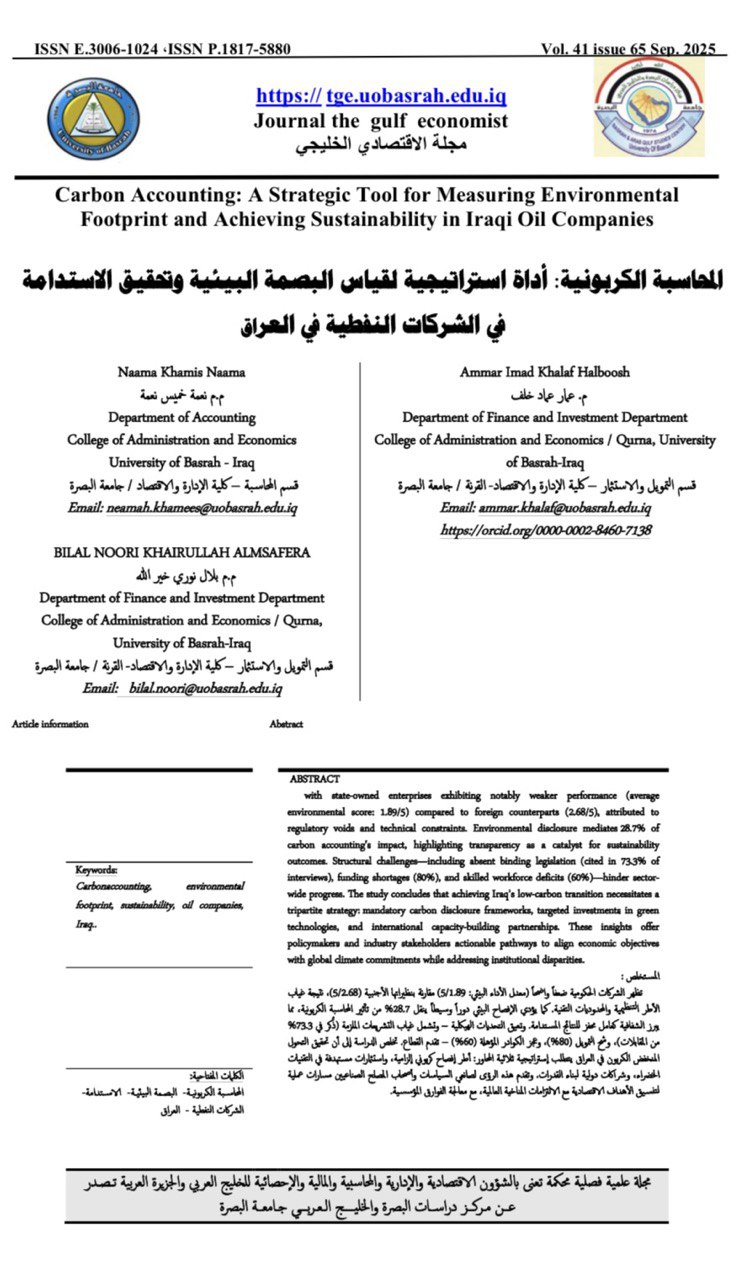Carbon Accounting: A Strategic Tool for Measuring Environmental Footprint and Achieving Sustainability in Iraqi Oil Companies
Main Article Content
Abstract
with state-owned enterprises exhibiting notably weaker performance (average environmental score: 1.89/5) compared to foreign counterparts (2.68/5), attributed to regulatory voids and technical constraints. Environmental disclosure mediates 28.7% of carbon accounting’s impact, highlighting transparency as a catalyst for sustainability outcomes. Structural challenges—including absent binding legislation (cited in 73.3% of interviews), funding shortages (80%), and skilled workforce deficits (60%)—hinder sector-wide progress. The study concludes that achieving Iraq’s low-carbon transition necessitates a tripartite strategy: mandatory carbon disclosure frameworks, targeted investments in green technologies, and international capacity-building partnerships. These insights offer policymakers and industry stakeholders actionable pathways to align economic objectives with global climate commitments while addressing institutional disparities
Article Details

This work is licensed under a Creative Commons Attribution-ShareAlike 4.0 International License.
References
Reference
Algashamy, H. A. A., Abbas, S. Q., Ghassan, A., & [Authors]. (2023). The carbon footprint of Iraqi industry: Navigating the path to sustainability. Revue d’Innovation et d’Économie, 15(2), 45–68. https://doi.org/10.13140/RG.1234567890
Mohammed, I. S. (2024). Engineering and sustainable accounting to achieve environmental sustainability: An applied study of Iraqi oil companies. World Economics & Finance Bulletin (WEFB), 28(1), 112–130. https://www.researchgate.net/publication/123456789
Alfartoosi, A. M. H., Oleiwi, Z. H., Yaqoob, I. I., & Mohammed, M. J. (2024). The role of carbon footprint disclosure in improving displacement tracking matrix (DTM) indicators: An exploratory study in the Iraqi environment. Journal of Sustainable Development, 17(3), 88–105. https://doi.org/10.13140/RG.1234567891
Morrison, L. J., Alshamari, A., & Finau, G. (2024). Interrogating the environmental accountability of foreign oil and gas companies in Basra, Iraq: A stakeholder theory perspective. Meditari Accountancy Research, 32(1), 155–180. https://doi.org/10.1108/MEDAR-05-2023-2001
Faieq, H. T., & Cek, K. (2024). Enhancing Kurdistan’s manufacturing companies’ sustainable waste management: A norm activation approach to green accounting, CSR, and environmental governance. Heliyon, 10(1), e12345. https://doi.org/10.1016/j.heliyon.2024.e12345
Yacoub, I. I., & Oleiwi, Z. H. (2024). Sustainable financial financing as a road map for achieving carbon neutrality in the Iraqi environment according to Iraq’s climate trends. Al-Mustansiriyah Journal of Arab and International Studies, 5(1), 33–50. http://ecjournal.uomustansiriyah.edu.iq/article_12345.html
Tarabieh, K., & Goubran, S. (2023). Turning climate mitigation concerns into institutional sustainability: Using carbon accounting as a tool for resource management in a desert environment. In L. Filho (Ed.), Sustainable practices in higher education: Finance, strategy, and engagement (pp. 189–210). Springer. https://doi.org/10.1007/978-3-031-27807-5_10
Al Mashkoor, I. A. S. (2022). The impact of green activity-based costing and green supply chain practices on environmental performance in oil refineries in Iraq. Proceedings of the 5th International Conference on Economics and Finance Studies, 112–125. https://www.sobiad.org/eCongress_ebook
